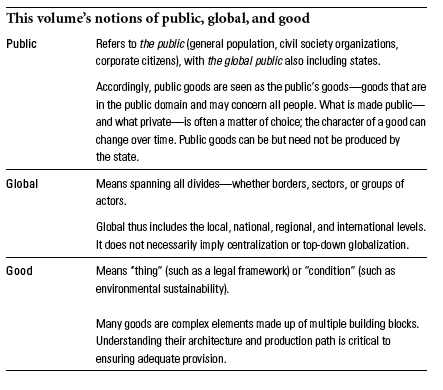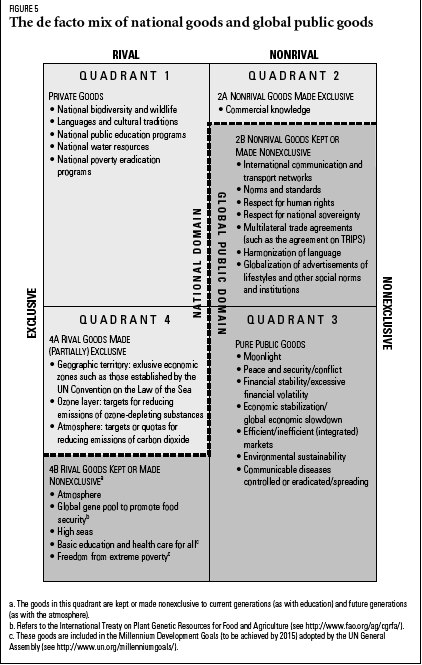Global public goods
Introduction
“Global public goods are goods with benefits that extend to all countries, people, and generations.” Although the concept of public goods is an old one in economic theory, the current revival of the concept applied to the global realm, and to the intersection of the global and the national, the public and the private, owes much to the work of Inge Kaul, Raul Mendoza, Pedro Conceição, and Katell Le Goulven. Their edited collection published in 2003 by the United Nations Development Program, to which Kaul was attached, Providing Global Public Goods: Managing Globalization, opened the way to a new surge of theoretical and applied thinking about the need for, and the pathways to establishing and financing, such global public goods. The subtitle goes some way to explaining the sense of the book’s timeliness, and to the direction of its authors’ thinking. The emphasis on re-regulation, after several decades of the dominance of the global public sphere by neo-liberal economic thought, was not a simple reversion to anachronistic or ideologically driven economics, but rather the result of wide-ranging reconsideration of the political and social conditions of global sustainability. The discussion of global public goods brought back a missing interface between discussions of globalisation, government policy, and civil society, providing a framework for the latter to articulate transnational governmental requirements for civility and sustainability.
Kaul and her colleagues provided applications of the concept to disease control, financial stability and market efficiency, multilateral trade negotiations, biodiversity conservation, energy policy, water rights, and the question of corruption. Kaul went on to argue the centrality of global public goods as central to any chance of realising the Millenium Development Goals. Since then the International Task Force on Global Public Goods has extended the application of the concept, and the gpgNet: the global network on public goods has provided a framework for research interaction.
See also:
Analysis
Conceptual studies
Providing Global Public Goods: Managing Globalization, Inge Kaul, Pedro Conceição, Katell Le Goulven, and Ronald U. Mendoza, eds., New York: Oxford University Press, 2003:
- Why do Global Public Goods Matter Today? Inge Kaul, Pedro Conceição, Katell Le Goulven, and Ronald U.Mendoza
- Advancing the Concept of Global Public Goods, Inge Kaul and Ronald U. Mendoza.
Why do Global Public Goods Matter Today? Inge Kaul, Pedro Conceição, Katell Le Goulven, and Ronald U.Mendoza.
Despite an ever-growing volume of international conferencing and decisionmaking, global public bads linger on and cross-border spillovers
continue. The provision of public goods today—nationally and internationally—resembles the provision of public goods in the Middle Ages. It involves multiple authorities and actors of varying power at different jurisdictional levels, reacting to crises in ways that are moved more by “political compulsion than concern for all” (Keane 2001, p. 4).Although the analyses in this volume point to many weaknesses, they also provide encouraging and constructive policy messages. They suggest that it is desirable and feasible to correct many current problems. In particular, they propose four main ways of improving the provision of global public goods and making globalization more manageable:
- Refurbishing the analytical toolkit—to better reflect current realities in public goods provision.
- Matching circles of stakeholders and decisionmakers—to create opportunities for all to have a say about global public goods that affect their lives.
- Systematizing the financing of global public goods—to get incentives right and secure adequate private and public resources for these goods.
- Spanning borders, sectors, and groups of actors—to foster institutional interaction and create space for policy entrepreneurship and strategic issue management.
The analyses confirm that reforming the process of public policymaking is key to managing globalization better. As the contributions to this volume demonstrate, in many global issue areas countries from the most advanced to the least developed increasingly find cooperation necessary to achieve national goals. Indeed, the fate of many nations has become increasingly intertwined, transforming what were once national policy issues into regional issues—and regional issues into global ones. Thus as issues such as HIV/AIDS, financial stability, and peace and security bring nations into a shared fate, so too should they bring them together as partners in appropriately reformed public policymaking. What this volume proposes is that examining today’s major policy challenges through the lens of global public goods is key in guiding the reform of public policymaking.
The de facto mix of national goods and global public goods (Kaul and Mendoza, 2003)
- Source: “Advancing the Concept of Global Public Goods” in Inge Kaul, Pedro Conceição, Katell Le Goulven, and Ronald U. Mendoza, eds., Providing Global Public Goods: Managing Globalization. New York: Oxford University Press, 2003
Click here for larger image
Global Public Goods: A Key To Achieving The Millennium Development Goals, Inge Kaul, Office of Development Studies, United Nations Development Programme, January 2005.
The Millennium Development Goals (MDGs) are an ambitious international initiative. Their attainment calls for focusing efforts and using available resources as efficiently as possible. This, in turn, requires among other things, to promote an adequate mix of private goods and public goods. Some of the critically important public goods are global public goods (GPGs) that today are either severely underprovided or malprovided, and as a result, impeding rather than fostering economic growth and development in developing countries. Enhancing the provision of these goods could be a decisive—and cost-effective—step towards meeting the MDGs. And it could be politically attractive, too, since all stand to gain, industrial and developing countries alike.
The main recommendation emerging from the discussion is that many of the suggested changes are of a re-regulatory nature, aimed at reshaping and modernizing current international regimes. Therefore, they are also changes that could be effected speedily and without placing a major burden on the public budgets of donor countries.
The Provision of Global Public Goods, Katell Le Goulven, The Courier ACP-EU 2004.
Meeting Global Challenges:International Cooperation in the National Interest, Main Report, Co-Chairs; Ernesto Zedillo and Tidjane Thiam, International Task Force on Global Public Goods.
The under-provision of global public goods is not an abstract problem. The security of states, the prosperity of economies and the health of people and the planet all depend on the effective supply of global public goods. To illustrate, we focus on six global public goods whose provision is critical to the health, prosperity and security of all people:
• Preventing the emergence and spread of infectious disease.
• Tackling climate change.
• Enhancing international financial stability.
• Strengthening the international trading system.
• Achieving peace and security, which underlies and is essential to all the others.
• In illustrating the kinds of strategies needed to pursue these goals, we also identify a cross-cutting issue—generation of knowledge.
These are priorities because the threats posed by global ills are rapidly mounting. Because the issues are interlocking, each adding to the other, none are able to be adequately addressed in isolation (as in the vital relationship between trade and security or infectious disease and trade). Because the benefits of supplying them are substantial. Because failing to supply them would have significant and in some cases irreversible consequences. And because they are important to a range of public and private constituencies whose engagement is necessary for progress.
Meeting Global Challenges: International Cooperation in the National Interest, Summary, Co-Chairs; Ernesto Zedillo and Tidjane Thiam, International Task Force on Global Public Goods.
Supporting Provision of Regional Public Goods in the Asia and Pacific Region, Asian Development Bank, 2007.
Global Public Goods: A Framework for the Role of the World Bank, International Monetary Fund and the World Bank, 2007.
This article focuses on the provision prognosis for regional public goods (RPGs) and the role of
international organizations in fostering supply in developing countries. All three properties of
publicness – i.e., nonrivalry of benefits, nonexcludability of nonpayers, and the aggregation
technology – play a role in this prognosis. The paper highlights many provision impediments,
not faced by national or global public goods. When intervention is necessary, the analysis
distinguishes the role of global, regional, and other institutional arrangements (e.g., networks and
public-private partnerships).
Applications
Providing Global Public Goods: Managing Globalization, Inge Kaul, Pedro Conceição, Katell Le Goulven, and Ronald U. Mendoza, eds., New York: Oxford University Press, 2003:
- International Financial Stability and Market Efficiency as a Global Public Good, Stephany Griffith-Jones
- The Multilateral Trade Regime: A Global Public Good for All?, Ronald U.Mendoza
- Beyond Communicable Disease Control: Health in the Age of Globalization, Dyna Arhin-Tenkorang and Pedro Conceição, with a contribution by Michael Kremer
- Global Trade for Local Benefit: Financing Energy for All in Costa Rica, René Castro and Sarah Cordero
- Conserving Biodiversity: Reconciling Local and Global Public Benefits, Charles Perrings and Madhav Gadgil
- Corruption and Global Public Goods, Peter Eigen and Christian Eigen-Zucchi
- Governing the Provision of Global Public Goods: The Role and Legitimacy of Nonstate Actors, Michael Edwards and Simon Zadek
Expert Paper Series, International Task Force on Global Public Goods
- Infectious Disease
- Global Commons
- Financial Stability
- International Trade
- Peace and Security
- Knowledge
- Cross-Cutting Issues
Transboundary Water Management as a Regional Public Good. Financing Development — An Example from the Nile Basin, A. Jagerskog, A., Granit, A. Risberg, and W. Yu, SIWI, Report Nr. 20, 2007.
The Financing of UN Peace Operations. An Analysis from a Global Public Good Perspective. Alexander Kocks, Institute for Development and Peace, 2005.
Regional Public Goods and International Organizations, Todd Sandler, Review of International Organizations, March 2006.
This article focuses on the provision prognosis for regional public goods (RPGs) and the role of international organizations in fostering supply in developing countries. All three properties of publicness – i.e., nonrivalry of benefits, nonexcludability of nonpayers, and the aggregation technology – play a role in this prognosis. The paper highlights many provision impediments, not faced by national or global public goods. When intervention is necessary, the analysis distinguishes the role of global, regional, and other institutional arrangements (e.g., networks and public-private partnerships).
Resources
gpgNet: the global network on public goods
gpgNet intends to serve researchers, policymakers, business and civil society as a platform for information exchange and discussion, on issues concerning the theory, policy design and practice of providing global public goods. The gpgNet is hosted by the Office of Development Studies in the United Nations Development Programme (UNDP).
gpgNet Knowledge Portal, Research categories
- General: Concept of global public goods, Politics of providing global public goods, Production process of global public goods, Financing global public goods
- The Main Actors: State, Business, Civil Society, Public-at-large
- Global Public Goods – Specific Issues: Environment, Health, Knowledge, International Communications, Transportation and Other Infrastructure Systems, Peace and Security, International Trade and Finance, Other Issues (including Culture, Education, Human Rights, Justice and Transborder Crime and Violence, others).
Project coordinator: Richard Tanter
27 May 2008



